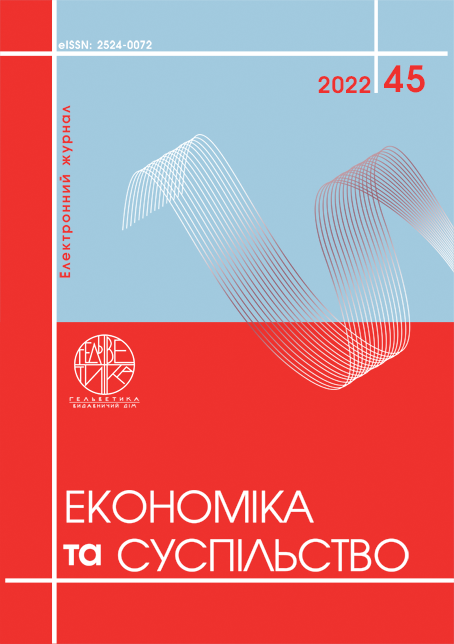RESEARCH AND DEVELOPMENT OF VALUE-TARGET MANAGEMENT IN THE CONDITIONS OF FOREIGN ECONOMIC ACTIVITY
Abstract
In today’s crisis conditions, the foreign economic activity of domestic enterprises is not in the best condition. Under such circumstances, the question of finding ways to improve the efficiency of foreign economic activity management of the enterprise remains relevant. Management of foreign economic activity is successful and effective when it is aimed at achieving corporate values and goals. Domestic enterprises usually focus only on goals, which does not allow them to use the potential of their employees as efficiently as possible. Today, the potential of fulfilling the possibilities of value-target management in improving the management of foreign economic activity of the enterprise is not fully disclosed, which determines the need for further research and development of this topic. The purpose of the paper is to research and develop value-target management in the conditions of foreign economic activity. To achieve the goal, the following research methods were used: abstraction, analysis, and synthesis, graphic method, generalization. The article reveals the general aspects of value-target management, and also offers a recommended technology for the implementation of the value-target management of foreign economic activity in the practical activities of the enterprise. The main idea of the value-target management of foreign economic activity is the development of value-target competencies in foreign economic activity managers aimed at achieving the company’s planned goals in the field of foreign economic activity and success in international markets. The paper examines in detail the main stages of the proposed technology of value-target management of the enterprise’s foreign economic activity, provides recommendations for their practical use, and also determines how the effectiveness of the implementation of the proposed measures can be analyzed. The transition from traditional approaches to the management of foreign economic activity to a value-target one will allow domestic businesses to improve the processes of managing foreign economic activity, improve its efficiency, and increase competitiveness in foreign markets. The development of the competencies of foreign economic activity managers will directly affect the company’s achievement of planned indicators in the field of foreign economic activity (increase in the effect of export/import, the efficiency of export/import, increase in the number of concluded foreign economic contracts, etc.).
References
Сінчалова І. Ціннісно-цільова модель управління. Єдині цінності та цілі перетворюють співробітників в команду. Управління персоналом. 2019. № 10. С. 28‒38.
Харчишина О.В. Організаційна культура як фактор мотивації персоналу. Вісник Державного агроекологічного університету. 2008. № 1. С. 226–235.
Бригідир І. Управління розвитком соціально-економічних систем мікро-, мезо- та макрорівня. Наука молода. 2010. № 14. С. 11‒14.
Радкевич В. Компетентнісний підхід до професійного навчання персоналу підприємств. Професійна освіта: педагогіка і психологія. 2012. XIV (XIV). С. 277‒287.
Жуковська В.М. Попередження соціально-поведінкових ризиків персоналу на підприємстві торгівлі. Проблеми економіки. 2014. № 2. С. 366‒372.
Лінькова О.Ю. Особливості ціннісної моделі управління. Економіка розвитку. 2018. № 2 (86). С. 35‒41.
Що сприяє згуртованості колективу. Як згуртувати колектив? І навіщо це потрібно. URL: https://bit.ly/3VvSptg
Модель компетенцій: стрижень HR-процесів компанії. URL: https://bit.ly/3ifdgCD
Дідур К.М. Сучасні методи оцінки персоналу. Ефективна економіка. 2011. № 11.
Петренко О.О. Застосування методів «360 градусів» та «assessment-центру» для оцінки фахівців за компетентностями. Проблеми економіки. 2015. № 4. С. 216‒221.
Індивідуальний план розвитку спеціаліста в компанії: як це працює. URL: https://bit.ly/3UqCjjr
Sinchalova, I. (2019). Tsinnisno-tsilova model upravlinnia. Yedyni tsinnosti ta tsili peretvoriuiut spivrobitnykiv na komandu [Value-target management model. Common values and goals turn employees into a team]. Upravlinnia personalom ‒ Personnel Management, 10, 28‒38.
Kharchyshyna, O. (2008). Orhanizatsiina kultura yak faktor motyvatsii personalu [Organizational culture as a factor of personnel motivation]. Visnyk Derzhavnoho ahroekolohichnoho universytetu ‒ Bulletin of the State Agroecological University, 1, 226‒235.
Bryhidyr, I. (2010). Upravlinnia rozvytkom sotsialno-ekonomichnykh system mikro-, mezo- ta makrorivnia [Management of the development of socio-economic systems at the micro, meso and macro level]. Nauka moloda ‒ Young science, 14, 11‒14.
Radkevych, V. (2012). Kompetentnisnyi pidkhid do profesiinoho navchannia personalu pidpryiemstv [Competency approach to professional training of enterprise personnel]. Profesiina osvita: pedahohika i psykholohiia ‒ Professional education: pedagogy and psychology, XIV (XIV), 277‒287.
Zhukovska, V. (2014). Poperedzhennia sotsialno-povedinkovykh ryzykiv personalu na pidpryiemstvi torhivli [Prevention of social and behavioral risks of the staff at the trade enterprise]. Problemy ekonomiky ‒ Problems of the economy, 2, 366‒372.
Linkova, O. (2018). Osoblyvosti tsinnisnoi modeli upravlinnia [Features of the value management model]. Ekonomika rozvytku ‒ Development economics, 2 (86), 35‒41.
Shcho spryiaie zghurtovanosti kolektyvu. Yak zghurtuvaty kolektyv? I navishcho tse potribno? [What contributes to team cohesion. How to unite the team? And why is it necessary?]. Available at: https://bit.ly/3VvSptg
Model kompetentsii: stryzhen HR-protsesiv kompanii [Competency model: the core of the company’s HR processes]. Available at: https://bit.ly/3ifdgCD
Didur, K. (2011). Suchasni metody otsinky personalu [Modern methods of personnel evaluation]. Efektyvna ekonomika ‒ Efficient economy, 11.
Petrenko, O. (2015). Zastosuvannia metodiv «360 hradusiv» ta «assessment-tsentru» dlia otsinky fakhivtsiv za kompetentnostiamy [Application of «360 degrees» and «assessment-center» methods for evaluating specialists according to competencies]. Problemy ekonomiky ‒ Problems of the economy, 4, 216‒221.
Indyvidualnyi plan rozvytku spetsialista v kompanii: yak tse pratsiuie [Individual development plan of a specialist in the company: how it works]. Available at: https://bit.ly/3UqCjjr


